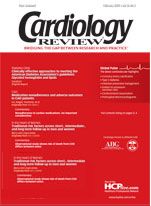Publication
Article
Cardiology Review® Online
A diabetic patient with chest pain
A 61-year-old woman was admitted to the hospital complaining of chest pain of 5 hours’ duration. She had had diabetes for 11 years, which was treated with metformin hydrochloride (Metaglip). She had smoked 10 cigarettes per day for the past 40 years.
On admission, the patient was normotensive (110/70 mm Hg) and had
no signs of heart failure. The electrocardiogram showed atrial fibrillation, with a ventricular frequency of 90 beats
per minute. In the anterior leads, ST-
segment elevation was diagnosed, and she underwent immediate coronary angiography, which showed significant stenoses in the right coronary artery and ramus circumflexus, with complete occlusion of the left anterior descending (LAD) coronary artery.
Primary percutaneous coronary intervention (PCI) of the LAD artery was performed, with restoration of coronary flow (Thrombolysis in Myocardial Infarction grade 3). After the primary PCI, the patient had incomplete resolution of the ST segment. The peak creatine kinase level was 3,165 IU/L, and the peak creatine kinase MB level was 583 IU/L. The left ventricular ejection fraction was 28%. During admission, the patient had one episode of heart failure and was discharged after 6 days. After 6 months, she underwent coronary artery bypass graft surgery. She died of progressive heart failure 3 years later.
